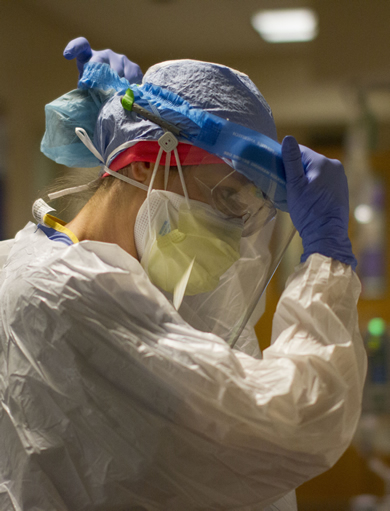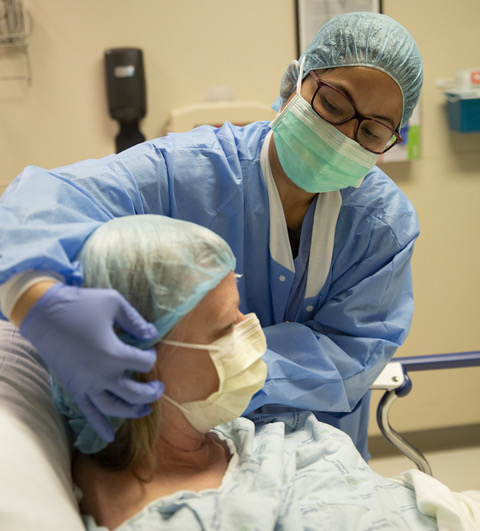
Recently, I had the incredible opportunity to sit down with my precious niece, Covid-19 front line worker/ER nurse Jenny Blackmon. We are approaching one year since our world was forever changed, as a global pandemic took over our country, our nation, and our world. When I asked Jenny to be a guest on my podcast, I felt a bit of guilt as I know how much mental, physical, emotional and sacrifice these brave individuals have given to protect our nation. Possibly the last thing any of our heroes want to do is time away from their families and talk extensively about the pandemic. Alas, I was blessed with her interview.

Jenny, a nurse for over 10 years shared the incredible sacrifice so many frontline workers have experienced. When asked what the most difficult part has been for the frontline workers, Jenny explained the fear that comes with being exposed to countless cases of Covid-19 every single day. However, something that could not have been predicted is the incredible generosity from the public. The appreciation from the public has been simply amazing, and so very appreciated. From restaurants donating meals, to strangers using 3d printers to make devices to keep masks from rubbing ears raw, the generosity from strangers has been amazing.
Jenny offers that the most surprising experience has been the fear that some people have of being around healthcare workers. “There are several people in my life who have always loved and supported me, yet they are terrified to be near me as a result of “high risk exposure” to Covid-19”. While it is extremely hurtful, she understands the fear. However, “it is those same people who fear my presence that continue to go to gyms, sporting events, grocery stores, and other public places and are thus exposed to the virus daily” this inconsistency making it difficult to understand the inconsistency of those who believe she and her family are too dangerous to be around.
While our country and health care workers experienced something somewhat similar with the 2012 Ebola outbreak, there was no way of being fully prepared for what the next virus would bring. In 2019, the healthcare system was alerted and prepped on a new virus, one that was far more dangerous than what we witnessed in 2012. Jenny offered that at the beginning, most health care workers didn’t expect the virus to be a big deal. However, it quickly led to an entire spring and summer of being shut down, which she explained happened at a time with minimal documented cases in Tarrant County. Going on to explain that “during the shutdown, our hospitals saw record-low patients. Nurses were laid off or placed on furlough. Many were asked to take paid time off as a way to save the hospitals financially”. The results of the early shutdown were seen once Texas began to ease restrictions, the effects extending far beyond just Covid-19 related illnesses. When Texas began to re-open, she explains “hospitals saw a huge influx of patients who were very ill from the inability to see their physicians in months. Numerous cases of uncontrolled blood pressure, heart disease, diabetes, infections, depression, and substance abuse”.

Where places such as New York were hit hard early on, Texas was fortunate to have had a rather delayed influx of infections, allowing more time to prepare for the inevitable. Fast-forward to the fall of 2020, when Covid-19 hit the state of Texas hard. For months, hospitals were so full, there was no room to see patients. Jenny assisted as the hospital she practices in converted half of the ER into a negative pressure area. Areas once used for storage being re-designated as a ‘surge’ area, used for the Covid-19 overflow. Converting what was once a storage area into a room filled with recliners, oxygen tanks, and monitors, all in an attempt to keep up with the number of patients walking through the hospital doors. Covid-19 patients with severe symptoms often require treatment for over a week, which creates a huge room-shortage in hospitals. As hospital stays are typically a few days, the necessity for extended stays created a logistical nightmare. Similar to Jenny’s hospital, many acted fast to accommodate this issue through whatever means possible. Further, emergency rooms became an “overflow” area for many hospitals, where patients who needed to be admitted would lay in an ER bed for days before getting a room. It became normal for hospitals to only be able to see patients in a recliner in their designated surge area. Jenny explains the gravity of the situation in that hospitals were treating strokes, traumas, and heart attacks in recliners rather than the usual patient rooms. Offering that it takes near-perfect communication and team work to ensure the safety of all patients. Recently, Texas hospitals are finally starting to see the number of Covid-19 patients decrease; thank goodness!
Jenny has had the unique experience of working in both mental health and emergency medicine. She has seen the huge impact this pandemic has had on so many mentally. An increase in depression, anxiety, suicidal ideation, drug and alcohol abuse. Patients who have been sober for 20 years relapse due to loss of income and depression from social isolation. Her first-hand account serving and understanding of just how widespread the problems inflicted as a result of the Covid-19 pandemic.
How can we help?
Since this pandemic began, our health care workers have selflessly served the community every day. As this fight continues, they remain in need of help with food, shelter, daycare and critical equipment as they continue to provide their best care for patients. Your donation to the COVID-19 Response Fund supports the evolving work to ensure the health and well-being of the entire Texas Health community.
Please consider donating to the Texas Health COVID-19 Response Fund. Your assistance will help thousands of front-line Texas Health workers as they respond to the pandemic with courage and professionalism.
The Texas Health Resources Foundation raises funds that support programs across the Texas Healthy system.
https://www.texashealth.org/en/Foundation/COVID-19-Response-Fund
More ways you can help
Corporate support
Sponsor employee pantry event
Donate meals
Say ‘thank you’
Medical supplies
Give blood
From the bottom of my heart, thank you to all of the health care workers and first responders. You are the true heroes.

COMMENTS